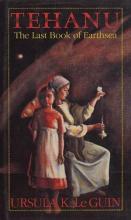Ursula Le Guin - Tehanu

"Tehanu" steps back from the series' focus on epic journeys and instead focuses on Tenar and her place in the world.
I like the exploration of identity and autonomy. Ged has lost his magic, so he has to shape a new identity for himself, and Tenar's life is changing. There is the idea of a person being shaped by the events around them and playing a role rather than being their own person. Tenar says, "I chose to mold myself like clay... I made myself a vessel. I know the shape. But not the clay. Life danced me. I know the dances. But I don't know who the dancer is." She is saying that even when she was given choices, she was only choosing a role for herself and that she didn't know who she was as a person.
I like that discussion because it eloquently lays out a question that many people have: who am I? Where does the individual begin and the social conditioning end? I disagree with the overall answer, though, because I don't think that there is a transcendent self separate from the person immanent in the world. As Chuck Palahniuk said, "Nothing of me is original. I am the combined effort of everyone I've ever known." In Tenar's analogy, the clay gains its meaning only as a vessel; the dancer is defined by the dances. The question shouldn't be trying to figure out who the dancer "really is" (as if there were some meaningful answer to that question) but rather to figure out the right dances to do. We shouldn't ponder on the nature of clay; we should make things with it.
The book has a focus on social structures. I remember reading some second-wave feminist writings by Catherine MacKinnon where she describes women as superior for reasons relating to their connection to the earth and bearing children and having periods and breastfeeding (if I recall correctly). Le Guin reflects, in her afterword, about a conversation. One character, Moss, says, "Who knows where a woman begins or ends?... I have roots... I go back into the dark!... Who'll ask the dark its name?" and the protagonist, Tenar, responds, "I will... I lived long enough in the dark." Moss' statement seems very much like MacKinnon's writing, and Tenar's response, very much in the theme of her explorations in the book, is an expression of dissatisfaction with the simple mysticism of second wave feminism. She feels as though other peoples' explorations of identity aren't helping her own search, and a reflection of the power structures and systemic injustices that she has experienced are more relevant to her than discussions of intrinsic identity.



